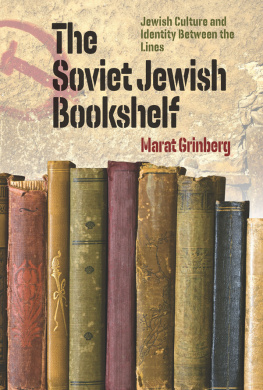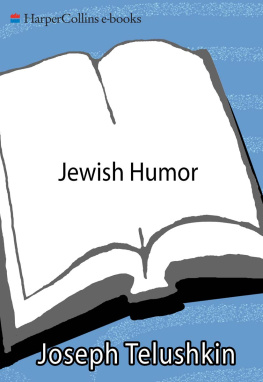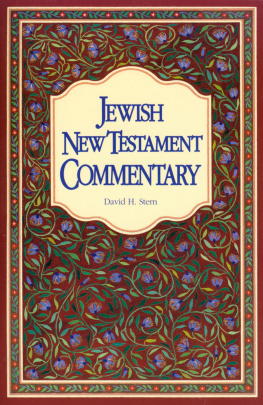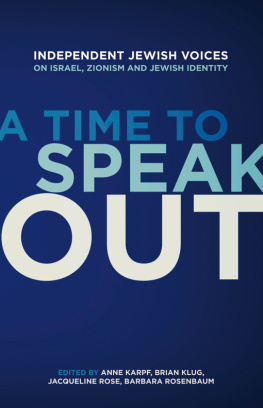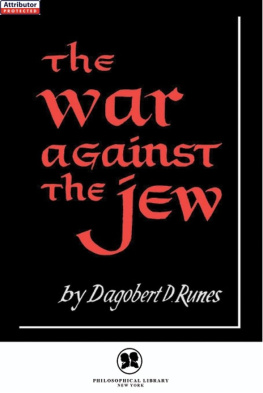ON THE ORIGINS OF JEWISH SELF-HATRED

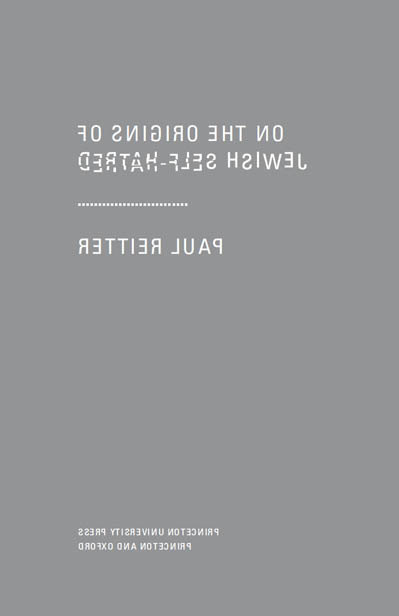
ON THE ORIGINS OF
JEWISH SELF-HATRED

PAUL REITTER

Copyright 2012 by Princeton University Press
Published by Princeton University Press, 41 William Street, Princeton, New Jersey 08540
In the United Kingdom: Princeton University Press, 6 Oxford Street, Woodstock, Oxfordshire OX20 1TW
press.princeton.edu
All Rights Reserved
ISBN 978-0-691-11922-9
Library of Congress Control Number: 2012931223
British Library Cataloging-in-Publication Data is available
This book has been composed in Minion and Univers
Printed on acid-free paper
Printed in the United States of America
10 9 8 7 6 5 4 3 2 1
CONTENTS
ON THE ORIGINS OF JEWISH SELF-HATRED

INTRODUCTION
Terminology is the root of all unhappiness.
ANTON KUH
Origins and original meanings cling to some concepts more than to others. Or so it can seem. Take antisemitism, which entered the popular lexicon in 1879. It was then that a journalist in Germany dubbed his own outlook antisemitic, because he wanted to mark the difference between himself and bigots he deemed less serious. The applications and connotations of the term soon expanded. Within a few years, orthodox Jews had started using it to characterize their reform rivals. But no matter: antisemitism has long been the key category in the study of anti-Jewish prejudice, and in a way, this history has freed the concept from its beginnings. Havent we come to think that if a lot of us can work with antisemitism judiciously, then just about everyone should be able to? After all, when antisemitism is wielded as a means of inciting or smearing, we say little about the pull of old patterns. It is, for the most part, the wielder who gets the blame.
Now consider Jewish self-hatred. We find it, too, relied upon at the highest levels of scholarship. Yet Jewish self-hatred hasnt established itself there to the same degree as antisemitism, and this difference appears to have made, well, all the difference.often happens that the phrases history is held responsible, especially its early history. That Jewish self-hatred took shape as a polemical weapon, that it rose to prominence as an instrument of censurethese views have staple-like status in critical responses to the concept, quite a few of which feature claims about how the concepts original meanings have managed to hold their ground. Only Jewish self-hatred neither came about nor gained currency in the ways Ive just described. And so a revision, if not an apologia, is in order.
This isnt to suggest that every attempt to write the genealogy of Jewish self-hatred has been carried out in the service of a critique. There are other accounts, accounts that dont seek, in effect, to discredit the concept. But these have proven to be almost as misleading as the most programmatic ones, which raises a series of questions, beginning with: why? Why has the emergence of Jewish self-hatred been so hard to track? What is it about the history of the concept, and what is it about how we practice conceptual history, that has made for such a high rate of failure? In , I offer some answers. Doing so will involve examining the prehistory of Jewish self-hatred, which is, as it happens, also important for understanding the genesis of that particular notion.
Indeed, one of the aims of this book is to show that Jewish self-hatred was forged in opposition to the terms that look likeand that have been seen asits precursors.
Of course, we could say the same thing about many reckonings with the Jewish Question. What caused Dblin to wonder about Kuhs approach is probably that Kuh relies on local reference points in discussing not simply the plight of the Jews, but also the fate of all humanity. In fact, Jewish self-hatred is, in a sense, a consequence of the First World War and the large-scale reorienting to which the war led. Kuhs belief that much had become clearer and much had changed helped prompt him to call for a terminological shift, his logic being that the new situation should have at least elements of its own vocabulary. Generally speaking, the war radicalized both Kuhs and Lessings thought, while fostering, as well, greater complexity. Though hardly identical, both their responses to the events of 191418 entailed cultivating incongruousand even incompatibleideas about the ills of modern society. And as we will see, both Kuh and Lessing used Jewish self-hatred to resolve those tensions, and in such a way that the concept signifies just the capacity through which the Jews could teach the world how to heal itself.
Lessing, too, built upon Nietzsches thought, and Lessing almost certainly drew on Kuhs Jews and Germans when he wrote his higher-profile book, Jewish Self-Hatred (1930). What, then, about the effect of that work? Did the affirmative meanings that Lessing gave to Jewish self-hatred ever stick well enough to make their presence felt? For reasons that should become clear, this question is a good point from which to begin a new genealogy of Jewish self-hatredand thus it is also a good place to break off.
PART ONE
Genealogical Imperatives
The best author will be the one who
is ashamed of being a writer.
FRIEDRICH NIETZSCHE
In the spring of 1931, Theodor Lessing set off from his home in Hanover to take his first and, as it would turn out, his only trip to the Middle East. The journey had been a long time in coming. A feminist, a socialist, and an anti-noise and anti-imperialism activist who earned his living mainly as a kind of philosophical feuilletonist, Lessing was, as well, a Zionist, and at the age of fifty-nine, he had been one for more than thirty years. To his delight, Lessing learned in Jerusalem that his work had preceded him there. A letter to his wife excitedly conveys the news: Not far from the Wailing Wall, a Jew recognized me and addressed me by my name. He had just bought my Jewish self-hatred bookall the bookstores in the city have it.
If Lessing was glad to see his latest monograph being sold in Jerusalem, he hardly seemed surprised, and why should he have been? After all, Jewish Self-Hatred was an undertaking that important Zionists had backed. Siegmund Kaznelson, the director of the Jdischer Verlag (or Jewish Press), had
To say that he was right isnt saying much, since infighting at the press soon killed the series. But Kaznelson and Weltsch also came close to the mark about the impact of Lessings volume. If the book failed to create a sensation, it succeeded in causing a stir, quickly popularizing the catchy young term in its title: a product of the early interwar years, the concept Jewish self-hatred wasnt yet a decade old. Furthermore, with its mix of pathos-laden homily, colorful theory, and concise biography, Lessings text won over a parade of Zionist readers. Writing in Self-Defense in 1930, Felix Weltsch, a cousin of Robert, gave this gushing appraisal: The well-known philosopher has brought forth a deep-reaching psychology of the Jewish spirit, which shows us how to find the way that leads out of negation and decline, and to healing and freedom.
Next page

